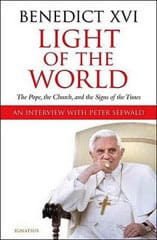 Recent coverage of Light of the World: The Pope, the Church, and the Signs of the Times, highlighted a very small -- but very controversial -- moment during the conversation between Pope Benedict XVI and Bavarian writer Peter Seewald.
Recent coverage of Light of the World: The Pope, the Church, and the Signs of the Times, highlighted a very small -- but very controversial -- moment during the conversation between Pope Benedict XVI and Bavarian writer Peter Seewald.
Was the pope "reversing" church teaching, floating a trial balloon, or simply broadening a conversation to include the notion of mercy? What other provocative or surprising themes arose in this interview, and have they been overshadowed by the "condom controversy"? Patheos asked several prominent Catholic writers to share their thoughts on the headlines, and Light of the World.
Heather King
Between Life and Latex
I like this idea of Church teaching being always in line with what is most human. Of course the condom that is being used to prevent the spread of AIDS is also sometimes going to be serving a contraceptive function. But I'm reminded of the years when, deeply mindful of the Church, I agonized about getting a divorce. I finally realized that if it came down to either committing suicide -- for such was my anguish in this marriage -- or getting a divorce, the movement toward further and continued life was to get a divorce. The fullest, greatest good is a lifelong marriage, in other words, but if due to human weakness and brokenness, that's not possible, we don't require people to die: the Church has established the annulment process, even though like all human processes, it is going to be sometimes abused. And if due to human brokenness and weakness, people with AIDS are prostituting themselves, we don't require them and the people with whom they have sex to die, or to open themselves to death, either.
So this is a beautiful movement toward recognizing Christ in the least of these, and in ourselves. But we have to remember also the larger issue: that we're called to order our lives to their smallest, most hidden hour toward creating a world where no person is so poor as to require selling his or her body. Where no person is so hungry for human love that they have to pay for a barren facsimile of it. Where no person -- whether they're prostituting themselves or not -- is so sick or so lonely that they have to put a lifeless rubber barrier between all that is most precious and inviolate in them, and all that is most precious and inviolate in another.
Heather King is a former lawyer, and the author of Parched (the dark years), Redeemed (crawling toward the light), and Shirt of Flame (forthcoming). You can also read her online at Shirt of Flame and Heather-King.Com.
John Zmirak
Sending up a Trial Balloon?
The pope's position, at face value, need not entail any development of doctrine.
Furthermore, a pope speaking only for himself, as a private theologian, does not even have the power to alter Catholic teaching. At least one pope, John XXII, while speaking as a private theologian, taught outright heresy. But this pope doesn't say things lightly, and it may be he's sending up a trial balloon, testing the reaction of the faithful to see if it would be prudent to add some shades of grey at the very edges of Catholic teaching.
The most traditional Catholic view of condom use is that it reduces an act of heterosexual intercourse to sodomy. The seed doesn't hit the ground, so what you have here is an intrinsically evil, unnatural act. The theology of Humanae Vitae --developed in response to non-barrier methods of birth control -- lays heavier emphasis on the issue of intent.
The contraceptive intent is intrinsically evil, but acts with licit intentions that had an accidental contraceptive effect might be moral -- for instance, if a woman takes a heart medication that also renders her sterile. If (and this is a very big if) some future non-private papal statement applied this logic to the use of condoms by married couples where one partner suffers from AIDS, it need not imperil the Church's core teaching on contraception. At least in theory. But pastorally, it could be seen as a crack in the wall, undermining the faith and practice of that crucial minority of Catholics who now obey Humanae Vitae -- who provide a vastly disproportionate percentage of the vocations, donations, and activism among Catholics.




